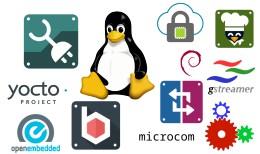Pengutronix Kernel Contributions in 2021
2022 has started, and although Corona had a huge impact on our workflow, the Pengutronix team again made quite some contributions to the Linux kernel. The last kernel release in 2020 was 5.10, the last one in 2021 was 5.15, so let's have a look at what happened in between.
Like always, Pengutronix' kernel contributions are driven by industrial embedded linux projects: our customers build devices, we look at what's already supported by the kernel and help with what's missing. Sometimes that means picking up patches from the mailing lists and improving them until they are ready for prime time, sometimes drivers have to be written from scratch, and sometimes even frameworks have to be modified to make a certain feature possible.
Patch series are usually first written to fulfill the project's requirements, then posted to the mailinglists and reviewed by the community and maintainers. So when a patch enters mainline, it often has a months-long, sometimes years-long history.
All in all, 675 patches written by Pengutronix found their way into the kernel in the 5.10 to 5.15 period - more than 1.8 patches per day, and authored by 14 colleagues:
| No of Patches | Author | No of Patches | Author |
|---|---|---|---|
| 202 | Uwe Kleine-König | 9 | Marco Felsch |
| 149 | Marc Kleine-Budde | 8 | Sascha Hauer |
| 118 | Oleksij Rempel | 2 | Jürgen Borleis |
| 48 | Lucas Stach | 2 | Rouven Czerwinski |
| 47 | Michael Tretter | 1 | Jan Lübbe |
| 45 | Philipp Zabel | 1 | Leonard Göhrs |
| 26 | Michael Grzeschik | 1 | Steffen Trumtrar |
| 16 | Ahmad Fatoum |
However, the pure number of patches rarely reflects the amount of work that was spent into bringing things mainline. Compared to earlier years, we have much more complex series related to graphics or network topics, which often need quite some rounds of review & rework until they hit mainline. In the end, kernel development continues being about high quality code, and it remains a lot of hard work to get even smaller patches into the kernel.
To get an impression about our work, let me look at the larger topics that have been worked on:
Uwe Kleine-König's patches are dominated by his interest in the PWM subsystem: 116 of the 202 patches are in that area. While PWM looks like an easy thing on the first glance, it turned out that there is a lot of undefined semantics and differing behavior between drivers. So many of these patches are made to improve the kernel towards better subsystem quality.
Other patches are in the NFC, Input, SPI, hwmon, firmware, backlight, leds, tty, device tree, clock, i2c, rtc and driver core area - functionality that turn up when you bring up random customer hardware and clean up things you find along the way.
Marc Kleine-Budde maintains the Linux CAN subsystem, so it's no surprise that 143 of his 149 patches are in the CAN subsystem. In many cases they have been made to improve performance of a certain CAN driver in a given customer scenario: the driver for the Microchip MCP251x (a widely used SPI-to-CAN controller) got 37 patches alone. Other work has been done for many other drivers (rcar, c_can, tcan4x5x, flexcan, at91, hi311x, peak_usb, m_can) and for the CAN subsystem itself.
Oleksij Rempel wrote many patches in the area of CAN / J1939 and related to ethernet switches and "modern" ethernet physics, such as 10-Base T1s.
Lucas Stach's patches are of course related to Etnaviv, the open source drivers for Vivante GPUs, but also related to clk, power and gpcv2. This reflects his work on bringing i.MX8M support in mainline forward.
Michael Tretter worked mainly on the Xilinx UltraScale family and on the "allegro" video encoder and decoder drivers on those chips - a big and complex series that needed many iterations and quite some time to come mainline. UltraScale is a great platform for customer specific video processing - a topic that is becoming more and more interesting for our customers!
Philipp Zabel maintains the reset subsystem in the kernel. In addition, he continued his work on the CODA and other i.MX graphics and video components.
Michael Grzeschik worked mainly in two areas: The KSZ8795 ethernet switch and USB UVC.
Ahmad Fatoum took care of many i.MX8M related bug fixes, including clock issues, TF-A interfacing and deferred probe handling. He also worked on STM32MP1, nvmem, dm crypt and sensors.
Marco Felsch, Sascha Hauer, Jürgen Borleis, Rouven Czerwinski, Jan Lübbe and Steffen Trumtrar worked on spi, ASoC, the CODA, ethernet chips and switches, pwms, i2c, Etnaviv, ecryptfs, quota, NAND flash, ubifs, DMA on i.MX, regulators, OP-TEE and network timestamping.
Last but not least, our hardware developer Leonard Göhrs got his first patch into the kernel, fixing an ALSA sound problem on PowerPC. :-)
Looking through the impressive list of 675 patches and knowing all the engineering stories behind small one-liners as well as super-huge patch series, I think we can be satisfied with what we improved in the kernel in 2021. A lot of interaction with the other kernel developers and maintainers happened along the way, and we learned a lot.
And, last but not least, quite many customer problems got solved in a sustainable way. Issues that are fixed in mainline will not hurt other people out there in the future. So please, if you would have been hit by a problem that we (or others in the community) already solved, please express your thankfulness by bringing your patches mainline as well. :-)
The kernel history goes back to Linux 2.5.0, and with the recent contributions, we now have 6278 patches in mainline.
Happy new year!
Further Readings
Pengutronix Recent Open Source Contributions
Let's take the Linux 6.19 release as an occasion to look at the Open Source code we've contributed to various upstreams in the last three months.Pengutronix at the Linux Plumbers Conference
The Linux Plumbers Conference 2024 will take place in Vienna from 18. to 20.09.2024. Luckily this does not overlap with the ELCE. Pengutronix will attend the LPC with six colleagues - so watch out for our T-shirts and hoodies and and feel free to chat with us.
umpf - Git on a New Level
Modern software development is commonly accompanied by a version control system like Git in order to have changes to the source code being documented in a traceable manner. Furthermore, any version state should be easily reproducible at any time. However, for work on complex projects such as the BSP ("Board Support Package") of an embedded system with its multiple development aspects, the simple stacking of the individual changes on top of each other does not scale.
Pulse Width Modulation (PWM) is easy, isn't it? - Turning it off and on again
Part of Uwe Kleine-König's work at Pengutronix is to review PWM (Pulse Width Modulation) drivers. In addition, he also sometimes refactors existing drivers and the Linux kernel PWM subsystem in general.
Pengutronix at Embedded World 2022
Welcome to our booth at the Embedded World 2022 in Nürnberg!
Pengutronix at FOSDEM 2021
"FOSDEM is a free event for software developers to meet, share ideas and collaborate. Every year, thousands of developers of free and open source software from all over the world gather at the event in Brussels. In 2021, they will gather online." -- FOSDEM








